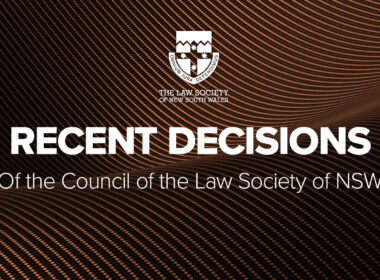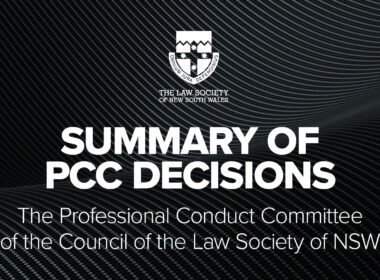Ethics and Standards Quarterly aims to provide the profession with more information about the co-regulatory role of the Law Society and the outcomes it achieves through regulation.
One of the things that has struck me in my time as President, but also a Member of the Professional Conduct Committee from 2013 to 2021, and Chair from 2019, is that there is not a great deal of understanding about the role of the Council in co-regulation, and the reasons why it is important a membership organisation plays a role in disciplining and educating the profession.
The Australian Council of Professions defines a Profession as:
…….. a disciplined group of individuals who adhere to ethical standards and who hold themselves out as, and are accepted by the public as possessing special knowledge and skills in a widely recognised body of learning derived from research, education and training at a high level, and who are prepared to apply this knowledge and exercise these skills in the interest of others.
It is inherent in the definition of a Profession that a code of ethics governs the activities of each Profession. … They define and demand high standards of behaviour in respect to the services provided to the public and in dealing with professional colleagues. Often these codes are enforced by the Profession and are acknowledged and accepted by the community
This statement captures the essence of why the Law Society plays a role in upholding standards through its regulatory functions. It is important to recognise this is a role it has undertaken since its earliest days as a membership organisation of like-minded professionals.
History of regulation
The Council has long played a role in regulating the profession through its predecessor organisations, both through the terms of its charters or membership rules, and ultimately under statute. Clause 25 of the Rules of the Sydney Law Library Society adopted in the 1840’s provided that any proprietor or subscriber “found guilty of any conduct deserving expulsion” could be expelled on the vote of 75 per cent of members.
Following the creation of the Incorporated Law Institute of NSW, a more systemic approach was taken to upholding standards for the profession, with the Institute petitioning for the removal of various ‘rogues’ from the Roll of the Supreme Court.
And since 1935, the Council’s (then the Institute) role in regulating the profession has been based on legislation when the Institute was first given powers to regulate trust accounts, administer the Fidelity Fund, discipline members and issue practising certificates.
Since 1993, the Society has performed its role in conjunction with the Legal Services Commissioner as a co-regulator, and since 2015 the Council’s role is enshrined in the Legal Profession Uniform Law Application Act.
Dealing with complaints
The Legal Services Commissioner is the designated local regulatory authority in NSW for complaints against solicitors. All complaints must be made to the Commissioner; however, the Commissioner has delegated complaints handling functions to the Council.
The Commissioner refers about 20 per cent of all complaints to be dealt with by the Council. In the 2022FY, this amounted to 606 complaints. These are classified as disciplinary matters.
In turn the complaints handling function is delegated to the three Professional Conduct Committees (PCC). The Committees comprise 34 members in total, 7 of whom are Councillors, 19 are Society members and 8 are lay people who bring a community perspective to decision-making.
A preliminary assessment of all complaints is conducted , and if considered warranted, an investigation will be initiated. If an investigation is not warranted, the complaint will be closed without investigation.
Solicitors are given an opportunity to make submissions as part of that investigation. The investigation is then considered by one of the PCCs which may either refer the matter to the NSW Civil and Administrative Tribunal (NCAT), or find that the solicitor has engaged in unsatisfactory professional conduct (UPC) and determine the complaint by making orders such as: a caution, a reprimand, a fine or a further education order (among other things).
Before a referral or finding is made, the solicitor is given a further opportunity to make submissions.
In FY 2022, the PCCs and the Department resolved 638 matters. Pleasingly the number of matters resulting in sanction were low, suggesting the vast majority of our profession uphold high standards:
- 9 complaints were referred to NCAT for disciplinary proceedings;
- 20 findings of unsatisfactory professional conduct were made resulting in a reprimand;
- 10 findings of unsatisfactory professional conduct were made resulting in a caution.
- The remaining matters, approximately 599 complaints, were either closed as no conduct was established, referred back to the OLSC or withdrawn.
What is the Council’s role in regulating the profession?
Practising certificates
Council is the ‘designated regulatory authority’ under the Legal Profession Uniform Law (NSW) (Uniform Law) for the grant and renewal of practising certificates. The Council must not grant or renew a certificate “if it considers that the applicant is not a fit and proper person to hold the certificate”.
The overwhelming majority of certificates are approved under delegation by the staff of the Law Society.
However a small proportion of matters need to be considered by either the Licensing Committee (for example where a solicitor is returning to practice) or by the Disclosure Committee, where the solicitor has disclosed either bankruptcy, criminal convictions or some other conduct.
Similarly, during the course of the practising year, serious conduct may come to the attention of the Society which raises issues as to the ongoing fitness of a person to practice. This can range from failing to comply with conditions on your practising certificate through to misappropriation of trust funds.
The most serious of these matters are referred to Council itself where it exercises powers to either refuse to grant or renew, vary, suspend or cancel certificates.
In exercising these functions, the Council complies with the Uniform Law and affords procedural fairness to any person in respect of whom it takes action.
Proceedings before NCAT and the Supreme Court
The Council also commences proceedings in the NCAT where conduct may amount to professional misconduct, or unsatisfactory professional conduct that is more appropriately deal with by NCAT. In 2022FY, 7 findings of professional misconduct were made by the Tribunal, with one recommendation for Roll removal and 6 solicitors were reprimanded.
In addition, Council commences proceedings in the Court of Appeal requesting that a solicitor’s name be removed from the Roll. This generally occurs where a solicitor has been charged with a serious criminal offence, or a recommendation has been made by NCAT. In 2022FY, 3 solicitors’ names were removed from the Roll.
Other regulatory functions of the Council.
Council is the designated local regulatory authority for a number of other matters under the Uniform Law. These include:
- The regulation of trust accounts.
- Appointing managers or trust supervisors to legal practices where there may be conduct issues, or a solicitor unfortunately dies or becomes incapacitated.
- Investigated instances of unqualified practice.
I look forward to these ideas being explored in future editions.
Overall, the Council’s role in regulating the profession is broad, and one it takes seriously. Not only does the community and government rely on us to perform this role effectively, but the maintenance of high standards of the profession by Council upholds the values and standards of the Law Society’s members, the profession and the broader community.




